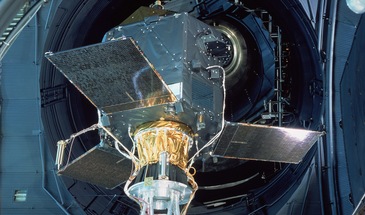Hipparcos Satellite

Overview
The main goal of the Hipparcos satellite was to make astrometric measurements. As a by-product it provided precise photometric measurements through two experiments :
- The Main Mission : 118 204 stars, wide Hp band.
- Tycho-1 Catalogue : 1 058 332 stars, in BT and VT bands.
Here, we present the results of the Main Mission. Hipparcos conducted a mean number of 110 measurements per star over 3.3 years. The program consists of a survey of around 53 000 stars complete to the magnitude Hp ≤ 7.9 + 1.1 sin(b) for stars earlier than G5 and Hp ≤ 7.3 + 1.1 sin(b) for stars later than G5, where b is the galactic latitude, and a set of 65 000 fainter stars selected for their astrophysical or astrometrical interest. The limiting magnitude of the program is Hp = 12.4.
Collaborators
- Internal
- Laurent Eyer
- Michel Grenon
- External
- François Mignard
- Floor van Leeuwen
Photometry
Variability
Geneva produced in collaboration with RGO (Royal Greenwich Observatory) the volume 11 and 12 of Hipparcos dedicated to variability. Hipparcos permitted to have a global description of variable phenomena across the HR-diagram. Thanks to its somewhat irregular sampling Hipparcos was able to detect numerous stars such as SPB and gamma Doradus stars. An analysis of the whole photometric data set was performed by two teams at the Geneva Observatory and at the Royal Greenwich Observatory (RGO). The goal was to produce the parameters as periods, amplitudes, epochs, variability type for all detected variable stars. The result are published by the European Space Agency as ESA SP-1200, 1997:
- Two catalogues (Volume 11):
- Catalogue of 2712 Periodic Variables among them 970 are new and 118 were NSV suspected.
- Catalogue of 5542 Unsolved Variables among them 4147 are new and 430 NSV.
- Three atlases (Volume 12):
Part of our work is described in:
- “Photometric Variability in the HR-Diagram” by L. Eyer and M. Grenon, 1997, ESA SP-402
- “Results from HIPPARCOS mission on stellar seismology” by L. Eyer and M. Grenon, 1997, IAU Symposium 185
Stars which are difficult to identify have charts produced either from GSC or DSS in ESA SP-1200, Volume 13, as described in The Atlas of Identification charts by D. Megevand et al.
Diploma and PhD thesis
- L.Eyer : The variable stars of the Hipparcos mission (in French)
